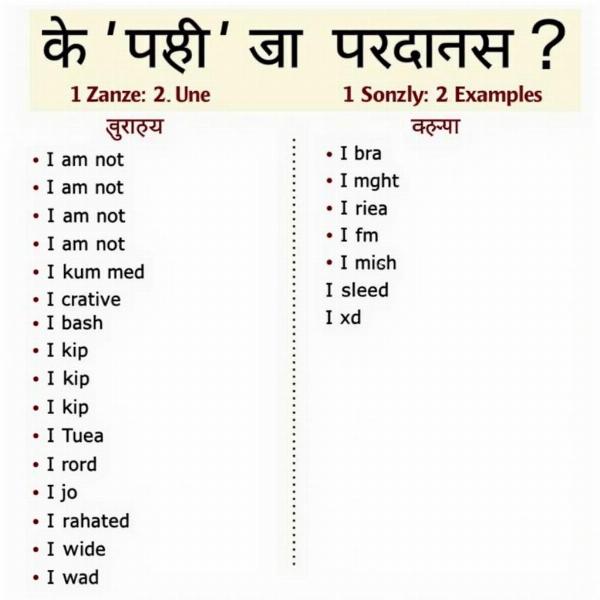Understanding the nuances of negation in Hindi can be tricky, especially when dealing with the seemingly simple phrase “I am not.” This article will delve into the various ways to express “I am not” in Hindi, exploring the subtle differences between each option and providing practical examples to solidify your understanding. We’ll cover formal and informal contexts, different verb conjugations, and even regional variations, equipping you with the knowledge to communicate effectively in a variety of situations.
Different Ways to Say “I Am Not” in Hindi
Hindi offers multiple ways to express negation, each with its own specific usage and implications. Let’s break down the most common translations of “I am not” and see how they function in different scenarios.
Main Nahin Hoon (मैं नहीं हूँ)
This is the most common and versatile way to say “I am not.” It’s suitable for most situations and can be used with both nouns and adjectives. For example:
- Main doctor nahin hoon (मैं डॉक्टर नहीं हूँ): I am not a doctor.
- Main khush nahin hoon (मैं खुश नहीं हूँ): I am not happy.
Main Nahin (मैं नहीं)
A shorter, more informal version of “main nahin hoon,” this is often used in casual conversation. While grammatically less complete, it’s perfectly acceptable in everyday speech. For example:
- Main nahin ja raha (मैं नहीं जा रहा): I am not going.
- Main nahin khata (मैं नहीं खाता): I am not eating.
Mujhe Nahin (मुझे नहीं)
This phrase translates to “not to me” or “I don’t.” It’s used when expressing dislikes, preferences, or when something doesn’t apply to you. For instance:
- Mujhe chai nahin pasand (मुझे चाय नहीं पसंद): I don’t like tea.
- Mujhe yeh nahin chahiye (मुझे ये नहीं चाहिए): I don’t want this.
Navigating Negation in Different Contexts
The context in which you use “I am not” can influence the appropriate Hindi translation.
Formal vs. Informal Settings
While “main nahin hoon” works well in both formal and informal settings, using “main nahin” is generally reserved for casual conversations with friends and family. In formal situations, stick with the more complete “main nahin hoon” for a polished and respectful tone.
Gender and Number Agreements
While the examples above use the masculine singular form, remember that Hindi verbs agree with the gender and number of the subject. For example, a woman would say “main nahin hoon” (मैं नहीं हूँ) while a group of men might say “hum nahin hain” (हम नहीं हैं).
Regional Variations
Like any language, Hindi has regional variations. While the core principles of negation remain consistent, you might encounter slight differences in pronunciation and word choice depending on the specific region of India.
Mastering Negation with Meaning-Hindi.in
Understanding the nuances of negation is essential for effective communication in Hindi. By grasping the different ways to say “I am not” and their contextual usage, you can express yourself accurately and confidently.
 Examples of Hindi Negation in Sentences
Examples of Hindi Negation in Sentences
Conclusion
“I am not meaning in Hindi” encompasses a range of expressions, each with its own subtle nuances and appropriate contexts. From the formal “main nahin hoon” to the informal “main nahin,” mastering these variations is crucial for accurate and effective communication. By exploring these different forms and understanding their usage, you can enhance your Hindi language skills and confidently navigate various conversational situations.
FAQ
- What is the most common way to say “I am not” in Hindi? The most common way is “main nahin hoon” (मैं नहीं हूँ).
- Can I use “main nahin” in formal situations? It’s best to use “main nahin hoon” in formal situations for a more polite tone.
- How do I say “I am not going” in Hindi? You can say “main nahin ja raha/rahi hoon” (मैं नहीं जा रहा/रही हूँ) depending on your gender.
- What does “mujhe nahin” mean? It means “not to me” or “I don’t” and is used for expressing dislikes or preferences.
- Does the translation of “I am not” change based on gender? Yes, the verb ending changes to agree with the gender and number of the subject.
Related Articles
- i am not interesting meaning in hindi
- i am not understand meaning in hindi
- i am not alone meaning in hindi
- i am not agree with you meaning in hindi
Meaning-Hindi.in is your premier destination for professional Hindi translation services. Whether you need business document translation, legal document certification, technical manual translation, website localization, or educational material translation, our team of expert linguists is here to assist you. We specialize in fast, accurate, and culturally sensitive translations across a wide range of industries. For all your Hindi translation needs, contact us at [email protected] or call us at +91 11-4502-7584. Meaning-Hindi.in is dedicated to bridging the language gap and facilitating seamless communication.